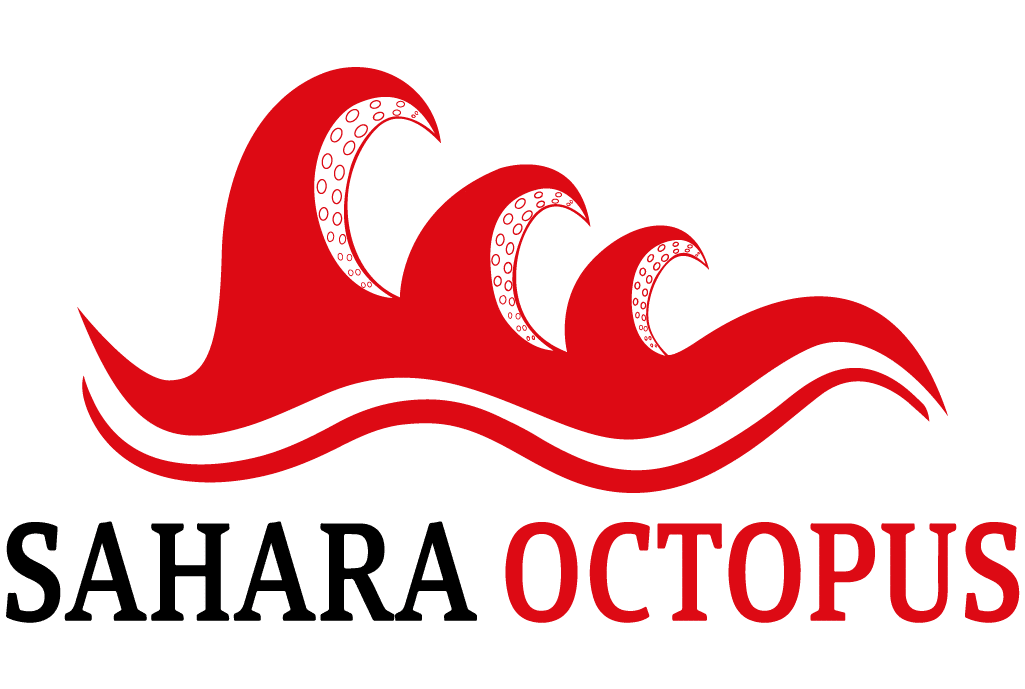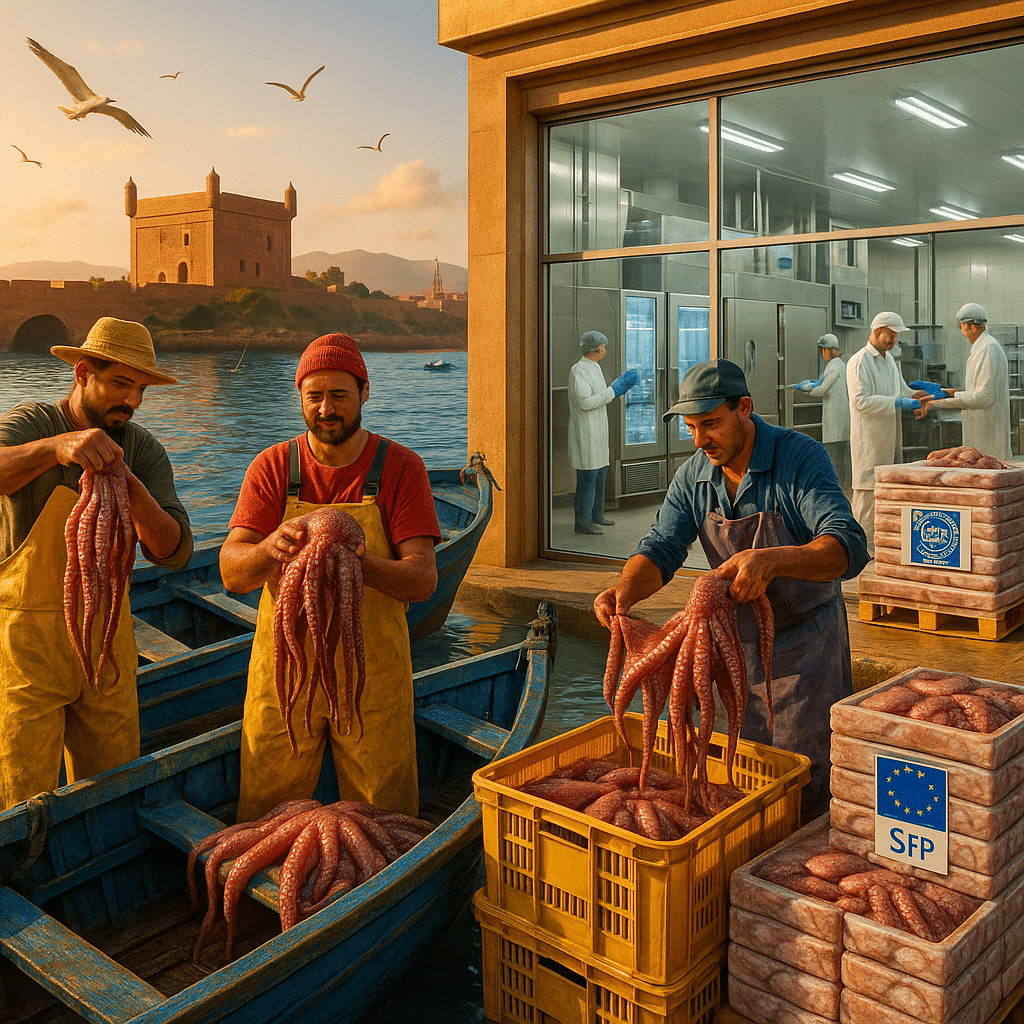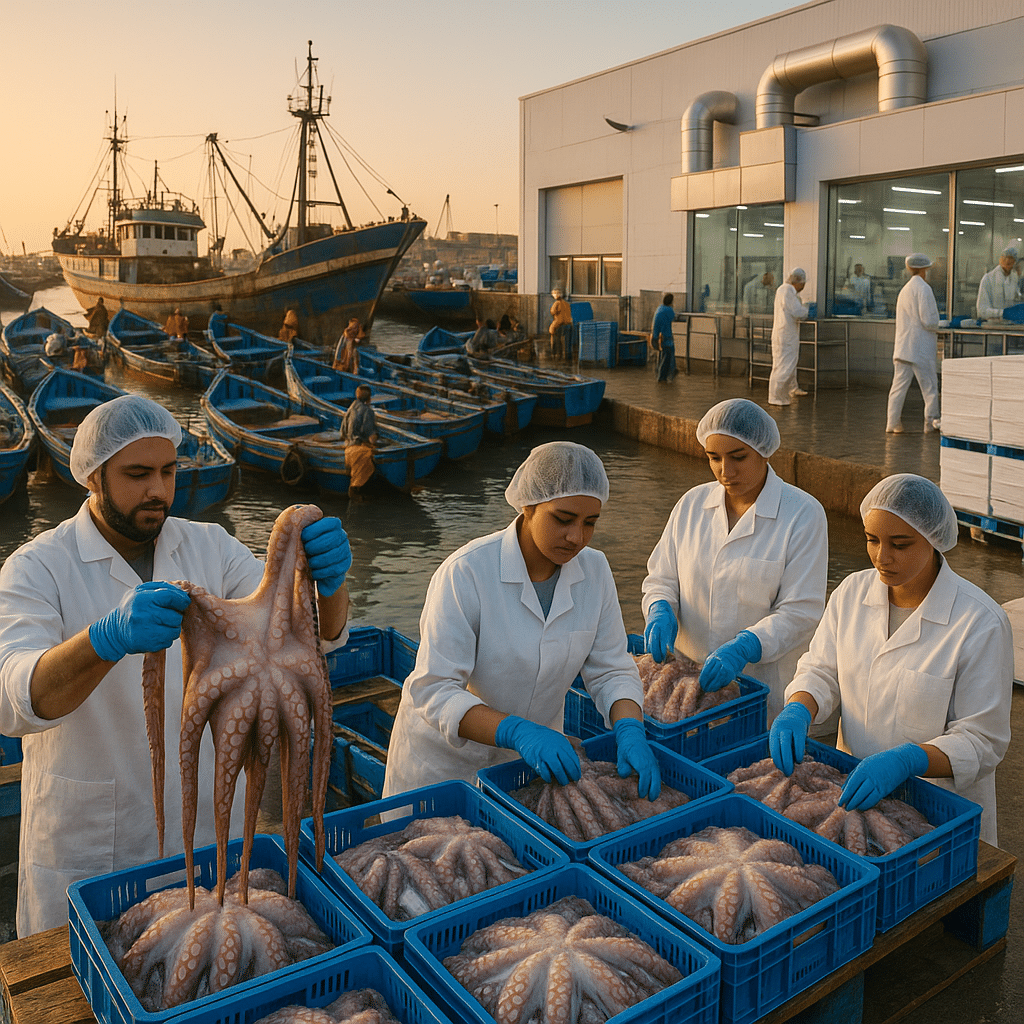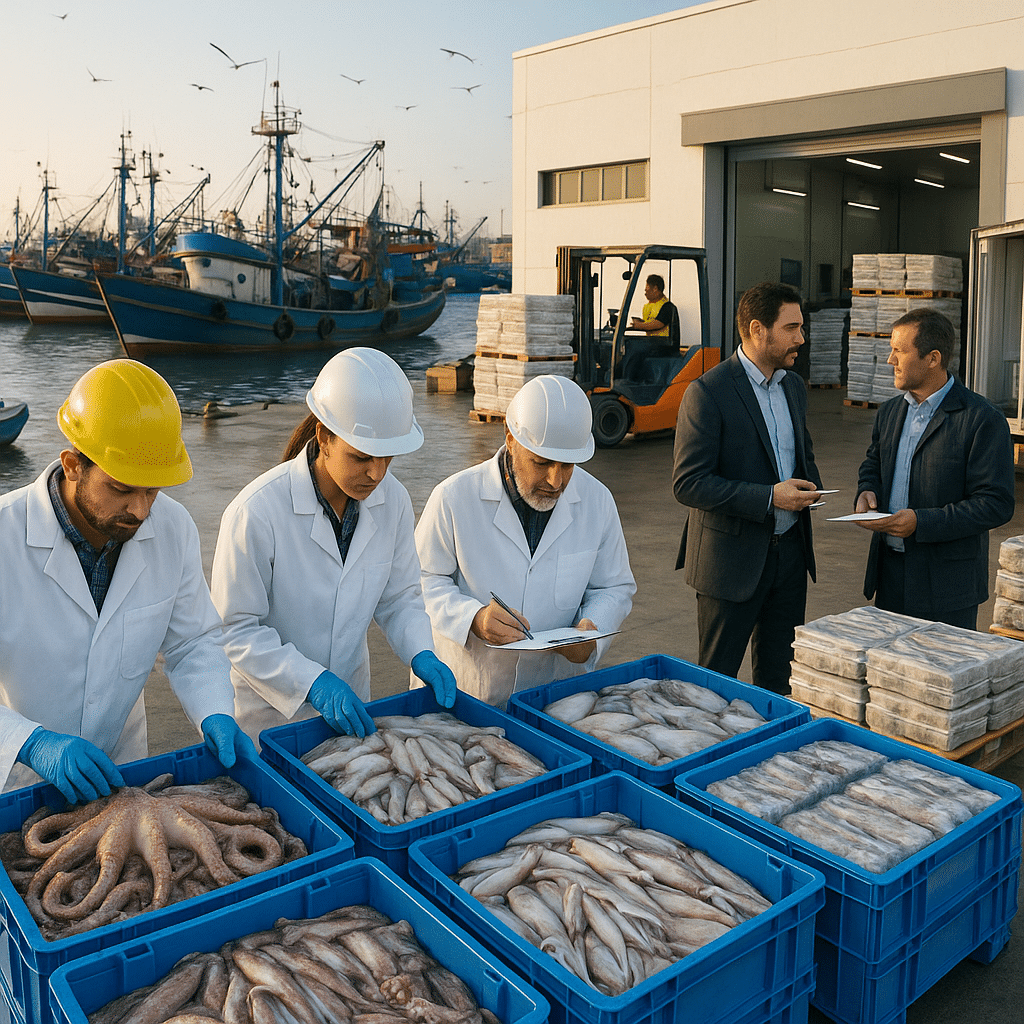Key Takeaways
Morocco is revolutionizing sustainable octopus fishing through innovative policies, such as the ‘Halieutis’ framework, while collaborating with global initiatives like the Sustainable Fisheries Partnership (SFP). These actions highlight the integration of environmental preservation, trade compliance, and long-term economic growth. Let’s explore the key drivers behind Morocco’s leadership in sustainable octopus initiatives.
Introduction
Morocco’s efforts to position itself as a global leader in sustainable octopus fishing rest on a foundation of forward-thinking policies and international partnerships. The ‘Halieutis’ framework, coupled with collaborations such as the SFP, addresses both overfishing and ecosystem preservation. Furthermore, these advancements enable suppliers such as Sahara Octopus to align with global trade standards while meeting environmental goals.
By prioritizing measures like regulated fishing seasons and thorough environmental assessments, Morocco ensures resource protection alongside industry growth. Additionally, bridging local strategies with global sustainability benchmarks cements its reputation as a reliable provider of ethically sourced seafood. Let’s uncover how these initiatives are redefining sustainable octopus practices and boosting Morocco’s global seafood competitiveness.
Morocco’s Approach to Sustainable Octopus Fishing
Morocco’s strategy for sustainable octopus fishing is anchored in the ‘Halieutis’ framework, a government-led initiative designed to promote sustainability, economic efficiency, and resource governance. This framework prioritizes ecosystem health by tackling overfishing and resource depletion directly.
Key measures under this framework include fishing effort controls, marine monitoring, and eco-certifications, which align Morocco’s practices with international standards such as those mandated by the Food and Agriculture Organization (FAO) and the EU. Through these measures, Morocco strengthens its status as a supplier of sustainable octopus products worldwide.
Case Study: Sahara Octopus
Sahara Octopus, operating in FAO Zone 34, embodies the principles of the Halieutis framework. With sustainable harvesting practices and advanced freezing technologies, this supplier not only supports ecological objectives but also delivers premium-grade seafood to global customers. Their adherence to sustainability exemplifies resource accountability and responsible seafood sourcing.
Moreover, licensing systems under the framework enforce seasonal closures, thereby restricting overharvesting. This approach contributes to healthier octopus stock while balancing conservation needs with industry imperatives.
International Collaborations: The Role of the Sustainable Fisheries Partnership
To bolster its fisheries strategy, Morocco partners with global organizations like the Sustainable Fisheries Partnership (SFP). The SFP enhances seafood supply chains by emphasizing sustainability compliance. Specifically, Moroccan octopus fishing gains robust regulatory reinforcement and increased visibility in the international market through this partnership.
Through SFP programs, Moroccan stakeholders access modern tools like stock assessment technologies sensitive to environmental health. These tools help prevent overexploitation and improve long-term yield. Companies such as Sahara Octopus benefit by demonstrating compliance with global sustainability standards, which reassures environmentally conscious buyers.
Aligned Standards and Trade Benefits
Moroccan suppliers that source sustainable octopus conform to SFP standards while meeting stringent EU import regulations. Traceability certifications, for example, strengthen buyer confidence, aligning suppliers like Sahara Octopus with eco-conscious supply chain requirements.
By pairing national policies with global collaboration, Moroccan fisheries are well-positioned to succeed in competitive export markets.
Seasonal Regulations and Local Impact on Overfishing Prevention
Seasonal restrictions form a cornerstone of Morocco’s strategy to combat overfishing. These regulations control harvest timing and volumes, enabling octopus populations to regenerate and ensuring ecosystem health. In biologically rich areas such as FAO Zone 34, these measures are critical for sustainability.
Example of Success
Seasonal closures, guided by the Fisheries Research Institute (INRH), have significantly improved octopus size and quality. Feedback from suppliers like Sahara Octopus reveals that stricter regulations boost global demand for Moroccan seafood due to its premium quality.
These regulations also support local artisanal fishermen with stable income opportunities through sustainable practices, further reinforcing the benefits of controlled harvesting.
Compliance with EU Sustainability Standards
The EU, as Morocco’s largest seafood market, requires rigorous compliance with sustainability certifications. By adhering to these standards, Moroccan exporters like Sahara Octopus gain a competitive edge in Europe.
Key Compliance Features for Moroccan Exporters
- Traceability Systems: Digital documentation ensures that only sustainable octopus reaches buyers, preventing blending with unsustainable sources.
- Quality Certifications: Eco-labels such as MSC authenticate adherence to sustainability standards.
- Eco-Friendly Standards: Transparency and environmental assessments boost credibility in eco-conscious markets.
These measures secure market opportunities for Moroccan exporters, while ensuring sustainable practices resonate with buyers worldwide.
Environmental Assessments and Biodiversity Management
Moroccan fisheries rely on environmental research to sustain marine biodiversity and economic growth. Annual evaluations conducted by INRH guide critical fishing policies, such as seasonal closures and fishing quotas, ensuring octopus populations remain healthy.
Benefits of Environmental Management
- Biodiversity Protection: Dedicated zones like FAO Zone 34 safeguard marine ecosystems while maintaining sustainable fishing practices.
- Increased Economic Returns: A 15% rise in octopus catch volumes demonstrates the economic viability of environmental policies.
- Consumer Trust: Transparent sourcing practices improve buyer confidence, particularly in premium markets.
Through innovative partnerships and scientific assessments, Morocco sets a benchmark for integrating ecological preservation with market-driven objectives.
Conclusion
Morocco has built a world-class model for sustainable octopus fishing through initiatives like the Halieutis framework, seasonal regulations, and collaborations with organizations such as the SFP. These measures not only preserve marine ecosystems but also advance compliance with trade standards, elevating the marketability of Moroccan seafood.
Suppliers like Sahara Octopus exemplify innovation and sustainability, delivering high-quality products to eco-conscious buyers. With rising global demand for ethically sourced seafood, Morocco’s approach serves as both an industry standard and a challenge for other nations to follow. Together, these efforts ensure a sustainable future for fisheries while securing Morocco’s leadership on the global stage.



